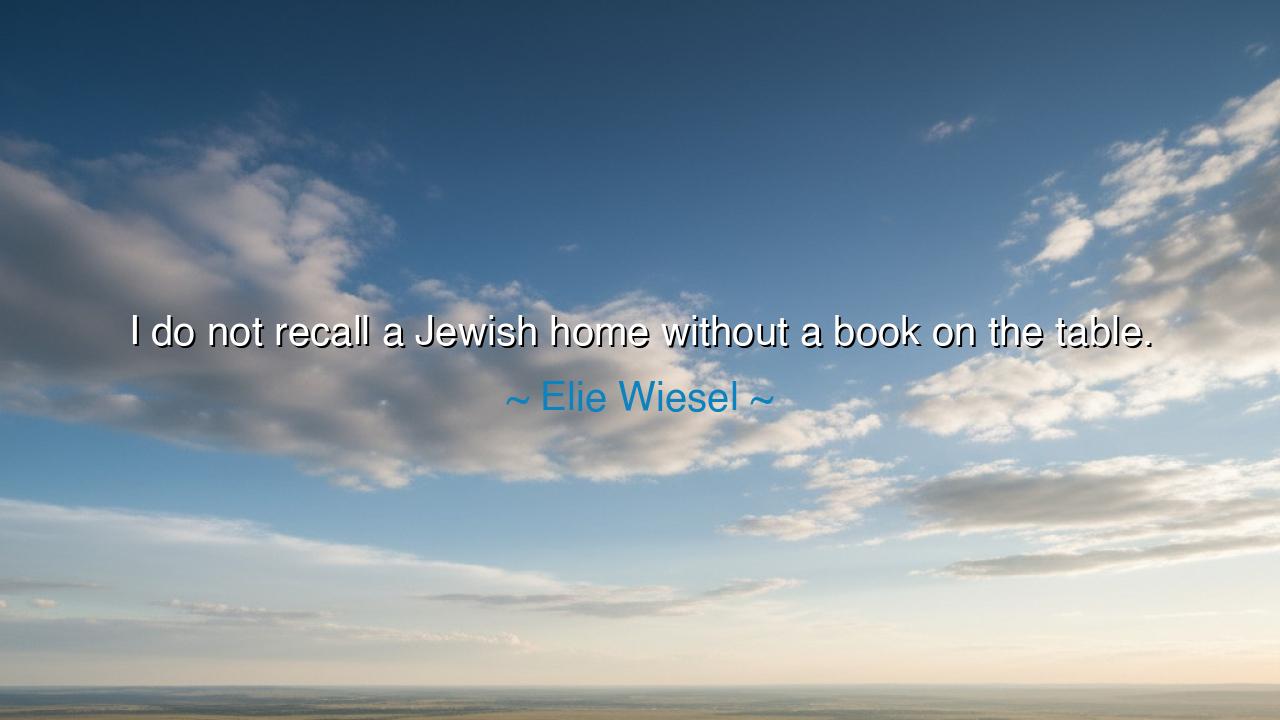
I do not recall a Jewish home without a book on the table.






When Elie Wiesel said, “I do not recall a Jewish home without a book on the table,” he was not merely describing a custom — he was honoring a sacred inheritance. His words summon an image as old as exile itself: a humble table, a lamp burning late into the night, and beside it, a book — a vessel of memory, faith, and survival. To the casual ear, this may seem a simple observation, but to the discerning heart, it is a revelation of a people who have carried their history not on their backs but in their words. In that quiet image — a book upon a table — lies the endurance of a civilization, the flame of learning that refused to die even when its bearers were cast into darkness.
The origin of this quote springs from Wiesel’s own life, a life etched by both tragedy and transcendence. Born in Sighet, Transylvania, he grew up in a home where the rhythms of study and prayer intertwined. His family’s life revolved around texts — the Torah, the Talmud, and the writings of sages whose wisdom bridged centuries. Even after the Holocaust shattered his world, Wiesel carried this memory as a beacon: that wherever Jewish families gathered — whether in the great cities of Europe or in small shtetls hidden among hills — there was always a book at the table, a companion to every meal, a silent witness to every joy and sorrow. It was not ornament or luxury, but necessity, for to read was to remember, and to remember was to live.
In his statement, Wiesel speaks not only of Jewish culture, but of the spirit of continuity — the unbroken chain of knowledge and identity that no oppression could sever. For centuries, when synagogues were burned and scrolls destroyed, the people rebuilt their libraries from memory. When forbidden to own land or bear arms, they wielded words instead. The book became both weapon and refuge, a fortress of meaning in a hostile world. It was at the table — the heart of the home — that these words found life again, passed from parents to children, not as dogma, but as conversation, as questioning, as the sacred act of seeking truth.
This reverence for the written word is not uniquely Jewish, but in the Jewish story, it burns with particular intensity. In the book of Deuteronomy, the commandment is clear: “You shall teach them diligently to your children, and shall talk of them when you sit in your house.” For the ancient Hebrews, learning was worship; study was prayer. Through ages of wandering, the book became their homeland — its pages the landscape of the spirit, its words the walls of an invisible temple. To lose the book would have been to lose themselves. Thus, when Wiesel recalls never seeing a Jewish home without one, he is bearing witness to a faith that made education a sacred duty, a torch passed hand to hand through the storms of history.
Consider the life of Rabbi Akiva, one of the great sages of the early centuries. He began as an illiterate shepherd, unable to read or write. Yet, moved by love and faith, he began to study late in life, enduring ridicule and hardship. In time, he became one of the greatest scholars of his generation, his teachings forming the foundation of the Talmud. When the Romans forbade study under penalty of death, Akiva defied them, teaching in secret. For this, he was executed — but even in death, he whispered the words of the Shema, proclaiming the unity of God and the sanctity of learning. His story is the living echo of Wiesel’s quote: a testament that books are not mere objects, but vessels of divine endurance.
Wiesel’s reflection also speaks to our modern world, where the table — once a place of gathering, discourse, and wisdom — has too often fallen silent, replaced by screens and haste. To have a book upon it is to make a declaration: that learning still matters, that memory still has a home. The book symbolizes more than knowledge; it symbolizes attention, presence, and care — the very qualities that bind generations together. In every home that keeps a book open, the conversation between past and future continues.
So take this lesson, seekers of wisdom and keepers of home: let there always be a book upon your table. Let it be a reminder that knowledge is nourishment, that wisdom feeds the soul as bread feeds the body. Read not only to learn, but to remember — to link your days to those who came before. Read with your children, your friends, your elders; let words live in the light of your voices. For as Elie Wiesel teaches, a home without a book is a home without roots, and a people without memory are as leaves scattered in the wind. But where the book remains, the spirit endures — and the fire of understanding, once kindled, can never be extinguished.






AAdministratorAdministrator
Welcome, honored guests. Please leave a comment, we will respond soon